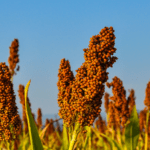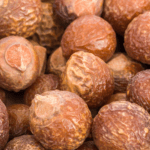SPECIAL DEALS - up to 50% OFF! Track Your Order Continue With Google

Buckwheat for Cancer Prevention: Why You Should Add Buckwheat Flour to Your Diet
Buckwheat for cancer prevention is researched in many Traditional diets in many areas of the world including buckwheat products regularly in their meals, and these diets are associated with much lower rates of cancer than typical Western diets. One reason may be the regular consumption of buckwheat flour, which has been shown to have antioxidant properties that help reduce oxidative stress and damage to cells. This means that buckwheat’s nutritional value goes beyond its high fiber content and makes it an excellent addition to your diet if you’re concerned about cancer prevention. Here’s how to add this healthy ingredient to your daily meals.
Table of Contents
What is buckwheat?
Buckwheat is a versatile and nutritious grain that has been used for centuries in many cultures. It is a gluten-free, plant-based food that is rich in fiber, minerals, and antioxidants. The grain is native to Central Asia and Eastern Europe and has been used in various forms for centuries.
Buckwheat is known for its unique nutritional properties, which can make it beneficial for cancer prevention. It is a source of healthy complex carbohydrates that provide sustained energy, as well as important dietary fibers that help promote digestive health and reduce the risk of colon cancer. In addition, buckwheat contains high amounts of lignans, compounds with antioxidant properties that have been linked to reduced risk of breast cancer and other types of cancer.
Including buckwheat regularly in your diet is an excellent way to help protect against cancer. Its nutrient content and antioxidant properties make it an ideal choice for those looking to maintain their health and reduce their risk of cancer.
The nutritional value of buckwheat
Buckwheat is a grain-like seed that has many health benefits. It is high in essential vitamins and minerals, including magnesium, folate, and dietary fiber. It is a good source of iron, phosphorus, zinc, copper, manganese, selenium, and potassium. It is also an excellent source of protein—one cup of buckwheat flour has about 14 grams of protein!
The most important benefit of buckwheat is its ability to help protect against cancer. Studies have shown that regular consumption of buckwheat may reduce the risk of certain types of cancers.
One of the primary ways buckwheat helps protect against cancer is through its high levels of antioxidants, which fight free radicals and reduce inflammation. Studies have found that eating buckwheat regularly can reduce the risk of colorectal and gastric cancers, as well as other forms of cancer.
Buckwheat is also a great source of dietary fiber, which helps to improve digestion and maintain healthy cholesterol levels. Additionally, buckwheat is low in calories, making it an ideal choice for weight loss or maintenance.
Finally, buckwheat is an excellent source of plant-based protein, which is essential for energy and building muscle. This makes it a great choice for athletes and those looking to increase their protein intake.
Buckwheat for Cancer: How it can Help?
Studies have shown that adding buckwheat to the diet may have a beneficial effect on cancer prevention.
Buckwheat contains a range of essential vitamins and minerals, including magnesium, iron, zinc, selenium, phosphorus, and manganese. It is also an excellent source of dietary fiber. All of these nutrients are important for maintaining overall health and well-being, but they also have the potential to help reduce the risk of certain types of cancer.
One of the most studied components of buckwheat is its high levels of rutin. Rutin is a bioflavonoid that has been found to have antioxidant, anti-inflammatory, and anti-cancer properties. Studies have found that rutin helps to protect cells from DNA damage, which can reduce the risk of developing cancer. Additionally, studies suggest that rutin may be able to prevent or delay the spread of cancer cells by inhibiting the growth and invasion of tumors. Rutin helps in strengthening capillary walls, which can help prevent cancer from spreading. Rutin also helps reduce high blood pressure, a risk factor for heart disease and cancer.
Buckwheat contains saponins, which are natural chemicals that have been shown to reduce the risk of breast and prostate cancer.
Another benefit of buckwheat is its high content of lignans. Lignans are plant compounds that are rich in antioxidants and have been associated with a lower risk of certain types of cancer, such as breast, prostate, and colorectal cancers. Studies have also suggested that lignans may be able to reduce inflammation, which may further reduce the risk of cancer.
The outer husk of buckwheat is mine of beneficial components and is also rich melanin pigment. These melanin pigment are long chain polymers of high molecular weight and difficult crystal structure. They are also highly bioactive components. The studies have found that, melanin is capable of protecting cellular system from mutagenic and cancer-causing factors and disactivating free radicals. It is also antiviral, antibacterial, antifungal and antioxidant.
Finally, buckwheat is a great source of fiber. Dietary fiber has been linked to a reduced risk of several types of cancer, including colorectal cancer. Fiber helps to regulate digestion and promote regular bowel movements, which can reduce the number of carcinogenic substances present in the colon.
Overall, adding buckwheat flour to your diet can be beneficial for cancer prevention. It is packed with vitamins, minerals, and other healthy compounds that can help to reduce inflammation, protect cells from damage, and reduce the risk of certain types of cancer. For these reasons, it is recommended to use buckwheat regularly in your diet for optimal health and wellness.
A study says the following about buckwheat:
It contains certain high-level nutritionally beneficial components and can have other characteristics as functional food. Buckwheat protein is of outstanding quality and, unlike popular cereals, is rich in essential amino acid, lysine. Health benefits of this plants include reducing plasma cholesterol level, anti-inflammatory, neuroprotective, anti-cancer, anti-diabetic effects and enhancing hypertension symptoms.
Noreen S, Rizwan B, Khan M, Farooq S. Health Benefits of Buckwheat (Fagopyrum Esculentum), Potential Remedy for Diseases, Rare to Cancer: A Mini Review. Infect Disord Drug Targets. 2021;21(6):e170721189478. doi: 10.2174/1871526520999201224122605. PMID: 33357186.
Adding buckwheat to your diet
Buckwheat is high in dietary fiber, which helps promote regularity and reduce cholesterol levels. It is also a good source of plant-based protein and has been shown to have a positive effect on blood sugar levels. Additionally, it is an excellent source of essential vitamins and minerals, such as magnesium, iron, and manganese.
The grain can be used in many forms such as flour, flakes, noodles, or whole grains. For those looking to add buckwheat to their diets, there are several ways to do so. You can cook up a batch of buckwheat groats or kasha, add buckwheat flour to baked goods, or use buckwheat noodles in a stir-fry or soup. You can even mix it into smoothies or oatmeal for a delicious breakfast treat.
Buckwheat flour can be used as an alternative to wheat flour in baked goods such as bread and muffins. Buckwheat noodles can be used as a tasty substitute for regular pasta dishes. Whole buckwheat can be cooked like rice or used in cereals and salads.
Overall, adding buckwheat to your diet can provide numerous health benefits and may even help reduce the risk of certain cancers. Whether you’re looking to prevent cancer or lose weight, increase your energy, or just want to improve your overall health, adding buckwheat to your diet is definitely worth considering.
Why Dhatu Organics Buckwheat Flour?
Dhatu Organics buckwheat flours is made from whole grain buckwheat (which contains husk as well), and is stone processed in small batches. Our buckwheat flour contains all the essential nutrients (including those present in the outer husk), which is not present in the other commercially available and refined buckwheat flour.
Facebook
Twitter
LinkedIn
WhatsApp
Discover more from Dhatu
Subscribe to get the latest posts sent to your email.




